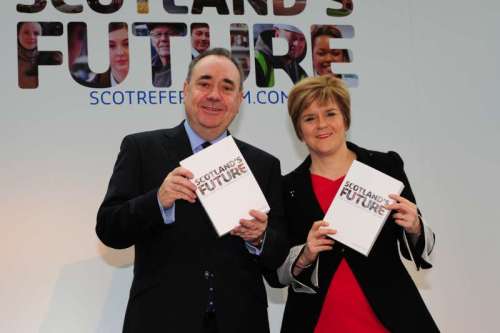
The three major Westminster parties have announced measures to woo voters to the No Campaign as the polls show a neck and neck race in Sept. 18 referendum to decide Scottish Independence.
The latest TNS poll showed that of all the adults surveyed, 39% were backing a “No” vote, 38% a “Yes” vote and 23% were undecided. Scottish Labour leader Johann Lamont, Conservative leader Ruth Davidson and Liberal Democrat leader Willie Rennie made a joint statement in Edinburgh, BBC reported.
Ms Lamont said she was “delighted” to endorse the “delivery plan” set out by former prime minister Gordon Brown.
First Minister Alex Salmond said the “No” campaign had “fallen apart at the seams”.
The announcement of backing for Mr Brown’s timetable came as a new poll suggested there was very little between the two sides in the Scottish independence referendum campaign.
The three party leaders made a statement on the steps of the Dynamic Earth museum in Edinburgh.
Ms Lamont said: “It is possible to vote ‘No’ on 18 September and also say you are voting for change, for more powers for the Scottish Parliament.”
She added: “We all have our political arguments, that’s what politics is like, but where we can agree we do agree and what we’ve said here is that the importance of this debate to the people of Scotland is to give them certainty that there will be more powers.
Scottish Conservative leader Ms Davidson said Gordon Brown had outlined a plan, which would come into effect in the result of a “No” vote, and Prime Minister David Cameron had endorsed it.
She said: “This is the way that Scotland can have what it wants most of all, which is full control and full levers of power over huge swathes of what we do in this country, how we deliver our public services without having to walk away from the strength and security of the United Kingdom.”
Mr Rennie, the Scottish Liberal Democrat leader, said: “All three parties are coming together as this is so important.”
He added: “We are going to commit to delivering on more taxation and more welfare, that’s the commitment that we are standing here to give – certainty to people in Scotland that they know, if they vote ‘No’ in September, it will lead to more radical change right across Scotland.”
Speaking at a Yes Scotland event on the Royal Mile in Edinburgh, the first minister said: “I think it is a very significant day in the referendum campaign. This is the day the ‘No’ campaign fell apart at the seams.”
Mr Salmond said the plan unveiled by Mr Brown and backed by the Scottish party leaders was “a retreading, a repackaging, a re-timetabling of what they said in the spring”.
In another development, Labour leader Ed Miliband has urged Labour councils to fly the Saltire to show their support for Scotland remaining in the Union. He joined the Mayor of Liverpool, Joe Anderson, to fly the Scottish flag from a council building in the city.
Better Together leader Alistair Darling was joined by First Minister of Wales Carwyn Jones, who made a speech in Edinburgh about the benefits of devolution within the UK.
The latest TNS poll showed that of all the adults surveyed, 39% were backing a “No” vote, 38% a “Yes” vote and 23% were undecided.
Of those who said they were sure to vote, the “Yes” and “No” camps were neck and neck at 41% with 18% undecided.
Yes Scotland described the poll as “another breakthrough” while Better Together said it showed there was “no room for a protest vote”.
The poll of 990 people was conducted between 27 August and 4 September.
The Scottish leaders of the pro-Union parties endorsed the timetable which was set out by Mr Brown in a speech at the Loanhead Miners Welfare and Social Club in Midlothian on Monday evening, the main points of which are:
Work to begin on the new legislation on 19 September, the day after the referendum
A “command paper” to be published by the present UK government setting out all the proposals by end of October
A white paper to be drawn up by the end of November after a period of consultation setting out the proposed powers
A draft for a new Scotland Act to be published in January
A spokesman said Downing Street was “content with the proposed timetable”, while Labour leader Ed Miliband said he wanted “the process of further devolution under way right after the referendum”.
The three main Westminster parties have all set out individual proposals for more powers for the Scottish Parliament previously.